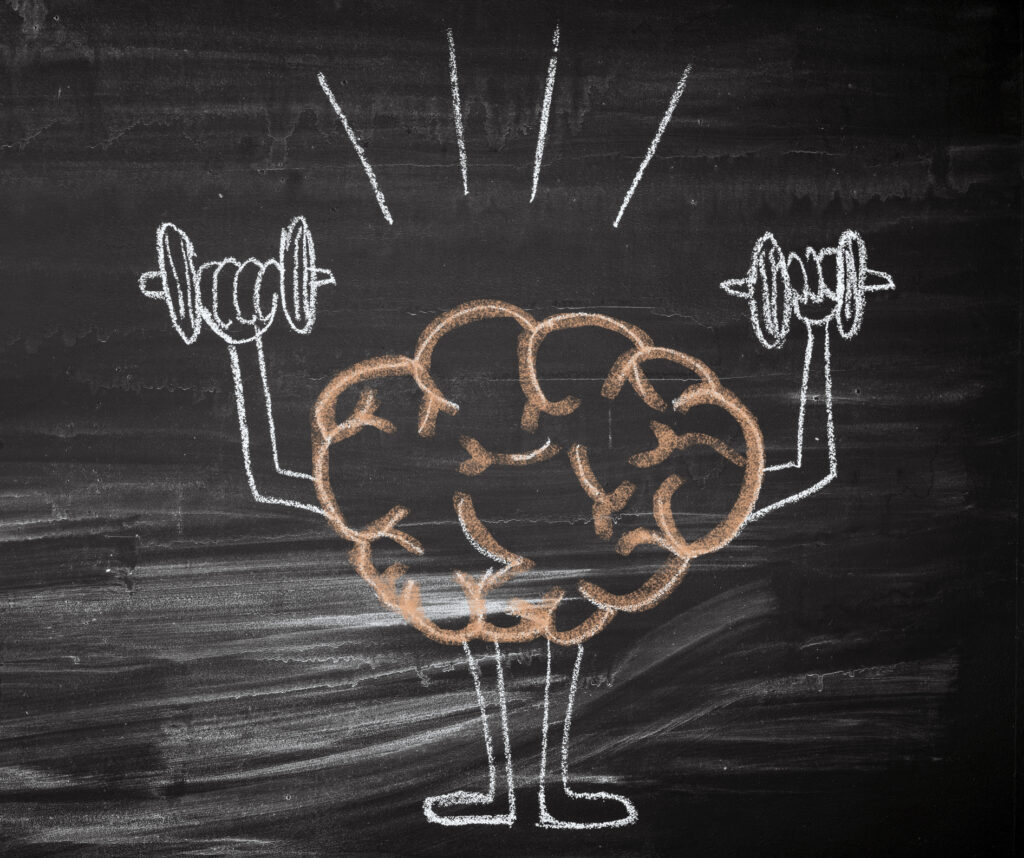Brain Fitness – Five Tips For A Healthy Brain
- BrainTap App, BrainTap Sessions, BrainTap Technologies, Education, Health and Wellness, Sleep, Stress Reduction
Share this post on social media


 Your brain is the most important organ you have. It’s the control center that runs every other system in your body. If you don’t keep it fit and healthy, your entire body suffers. And, just like physical fitness, brain fitness has many benefits for all the systems in our bodies.
Your brain is the most important organ you have. It’s the control center that runs every other system in your body. If you don’t keep it fit and healthy, your entire body suffers. And, just like physical fitness, brain fitness has many benefits for all the systems in our bodies.
We’re not talking about doing crunches with your brain; but just like you can do a variety of physical activities to keep your body fit, you also have a wide variety of choices to keep your brain fit. The result is a healthy, happy brain that keeps your body running in top condition for years to come.
In the same way physical fitness gives us the ability to respond to physical situations efficiently, brain fitness helps us respond to mental challenges effectively. Maintaining a fit brain gives us resilience in emotional situations and gives us tools to handle stressful situations, which lessens the chances of us sustaining emotional “injuries.”
For example, what happens when you’re in an argument with someone? If you aren’t mentally resilient, you may respond in a reactionary way. This causes negative consequences in our bodies due to elevated cortisol levels among other things. When you practice brain fitness, you have the ability to pause and recognize the choices you have in the way you respond to others. This alleviates having to go back after the fact and mend fences for something we may have said in the heat of the moment and reduces the stress our bodies have to process. This benefit can carry over to the hundreds of interactions we have with others during our regular lives.
in a reactionary way. This causes negative consequences in our bodies due to elevated cortisol levels among other things. When you practice brain fitness, you have the ability to pause and recognize the choices you have in the way you respond to others. This alleviates having to go back after the fact and mend fences for something we may have said in the heat of the moment and reduces the stress our bodies have to process. This benefit can carry over to the hundreds of interactions we have with others during our regular lives.
Studies show spending time outdoors can decrease anxiety, improve mood and improve memory. Being in nature calms your nervous system and stimulates the brain. It does this through something called Frequency Following Response.
Frequency Following Response, or FFR, is the brain’s ability to follow or sync to external auditory stimuli. An example of this is when a musician starts a metronome to stay on beat. Your brain automatically begins to follow external sounds and vibrations that are in your environment. Nature works the same way. The beach, mountains, and the city all have different frequencies and our brain naturally syncs to the resonant frequency in the area. That’s why it’s important to take time to be in nature. Our brain will sync to the frequency of the waves of the ocean or the sounds of the forest and it produces a calming effect on our nervous system which enables us to better control our emotional response to stress.
 Solution: Aim for 15-20 minutes of nature time each day. If you live in an urban area where you can’t easily get into the natural world, put on your headphones, close your eyes, and listen to the sounds of rain or ocean waves to gain similar effects. Better yet, listen to a BrainTap audio session such as Mountaintop Retreat or Enchanted Forest in the Stress Less bundle of the BrainTap Pro App.
Solution: Aim for 15-20 minutes of nature time each day. If you live in an urban area where you can’t easily get into the natural world, put on your headphones, close your eyes, and listen to the sounds of rain or ocean waves to gain similar effects. Better yet, listen to a BrainTap audio session such as Mountaintop Retreat or Enchanted Forest in the Stress Less bundle of the BrainTap Pro App.
Of course, we don’t have to remind you to actually breathe. Breathing is something we do on average 20,000 times a day. Even though it’s something we take for granted, our breathing affects every other part of our body, including brain fitness. When you breathe, you bring oxygen to the cells of the body. Those cells then use that oxygen to perform the tasks they need to accomplish each day to keep you healthy.
Take a moment and think about HOW you’re breathing. When you’re stressed and anxious, your breath comes in shallow bursts and you feel anything but relaxed. This type of breathing throws off the balance of oxygen and carbon dioxide in the blood and can cause anxiety, fatigue, and physical and emotional illnesses. Learning to breathe deeply and completely helps relax the body and calm the mind. It activates the parasympathetic nervous system and helps you avoid the fight or flight syndrome and prevents the body from producing excess cortisol.
Deep breathing is one of the best ways to reduce stress and tension in the body and promote brain fitness. When we are relaxed, our brain produces alpha brainwaves. Alpha is the brainwave state you want to be in to do your most creative work.
Solution: Breathing exercises are a simple yet effective way to help your body reduce stress and allow the brain to function at its most creative state. Some examples of breathing exercises are belly breathing, box breathing, 4-7-8 breathing, or mindful breathing.
Having a social network is important to brain health because it provides a source of mental stimulation, helps reduce stress, gives a person a necessary support system, and reduces instances of depression. Studies have also shown that people who have strong social interactions demonstrate less cognitive decline as they age. Learning to navigate social situations is like exercise for your brain and helps improve cognitive function. To learn more about how being social helps brain health, click HERE.
 Solution: Work on improving social skills and social interactions. Understanding that during these times, it may be difficult to get out and make new friends, concentrate on the friend circle you have. Plan weekly get-togethers and learn from each other. If you have a friend who can paint, have them hold a weekly painting class to share their skills. If you’re a great cook, plan a monthly dinner party and invite everyone to share a meal and a laugh. It can be daunting at first but the physical and mental benefits of making the effort will have your brain thanking you in the long run.
Solution: Work on improving social skills and social interactions. Understanding that during these times, it may be difficult to get out and make new friends, concentrate on the friend circle you have. Plan weekly get-togethers and learn from each other. If you have a friend who can paint, have them hold a weekly painting class to share their skills. If you’re a great cook, plan a monthly dinner party and invite everyone to share a meal and a laugh. It can be daunting at first but the physical and mental benefits of making the effort will have your brain thanking you in the long run.
This one isn’t new. You know that you’re supposed to drink water every day and a good amount of it. But do you know why? Drinking water hydrates your cells so they function properly to give your brain and body energy. When your brain is dehydrated it has to work harder to perform
 Solution: This is an easy one. DRINK. Drink your water, at least 64 ounces of water a day. If you’re active drink more. If you drink alcohol, you need more water. If you’re in a hot climate, drink more. Another healthy trick to include in your daily water routine is Celtic sea salts. This is not the same salt as typical table salt.
Solution: This is an easy one. DRINK. Drink your water, at least 64 ounces of water a day. If you’re active drink more. If you drink alcohol, you need more water. If you’re in a hot climate, drink more. Another healthy trick to include in your daily water routine is Celtic sea salts. This is not the same salt as typical table salt.
Celtic sea salt is salt collected from specific seashores which is then allowed to dry in the sun. These salts contain important minerals that our body needs such as high concentrations of magnesium and 34 other trace minerals. This type of salt actually helps keep your body hydrated more easily, reduces fluid retention, balances your electrolytes, prevents muscle cramps, improves skin texture and digestive function, helps maintain your adrenal glands, regulates blood pressure, and more. So this easy hack is one you should incorporate each and every day.
 Sleep is great for recharging the physical body but it’s also a vital part of having great brain health. Lack of enough sleep and lack of high-quality sleep affects every other system in your body. Sleep is as essential as food and water to our brain and body function.
Sleep is great for recharging the physical body but it’s also a vital part of having great brain health. Lack of enough sleep and lack of high-quality sleep affects every other system in your body. Sleep is as essential as food and water to our brain and body function.
Sleep affects many brain functions. It restores cell function so neurons can communicate effectively with each other. It affects every cell and tissue in the human body in some way. Sleep helps regulate mood, attention, metabolism, and more. Research shows if we don’t get enough good, quality sleep we are at an increased risk for high blood pressure, cardiovascular disease, diabetes, and obesity. To learn more about how vital sleep is, check out our blog HERE.
Solution: We know all the typical solutions to getting a better night’s sleep–cool temperatures, dark room, comfortable bedding. Get creative and add these unique sleep solutions you may not have thought of:
 Blow Bubbles. This one sounds a little silly, but blowing bubbles can really help you fall asleep. It mimics deep breathing such as the exercises recommended above, and this simple reminder of our childhood when stress was minimal can also help relax your brain into sleep easily and naturally.
Blow Bubbles. This one sounds a little silly, but blowing bubbles can really help you fall asleep. It mimics deep breathing such as the exercises recommended above, and this simple reminder of our childhood when stress was minimal can also help relax your brain into sleep easily and naturally.Trying these tips today will have you well on your way to maximum brain fitness in no time. For more brain-based tips and information register to receive the BrainTap Movement newsletter below.
Elevate your mind: Subscribe to our newsletter for insights on brain health, cutting-edge research updates, and personalized session suggestions to help you unleash your ultimate potential!


Customer Support
In order to streamline support requests and better serve you, we utilize a support ticket system. Every support request is assigned a unique ticket number. Please keep your support ticket number in a safe place and provide your number when contacting us.
Manufacturer’s Warranty
The BrainTap Headset Bluetooth model has a 12-month manufacturer’s warranty that covers any flaws or defects that the headset shipped with. Any sort of sustained physical damage is not covered under warranty. All other products or equipment come with a 30-day manufacturer’s warranty unless otherwise stated. Please reference your User Manual to view the complete warranty policy. Should you experience any difficulty with your equipment or accessories, we recommend first checking the troubleshooting guidelines in the User Manual included with the headset or reference our online Knowledge Base for headset tips and troubleshooting steps. If you are still having trouble and your headset is within the warranty period, call our Help Desk at 302-721-6677 or fill out an online support ticket for further assistance. If the item needs to be returned to BrainTap offices for assessment and replacement, you will be asked to provide proof of purchase and will be issued a Return Merchandise Authorization (RMA) number and shipping instructions. Items without proof of purchase will not be accepted for RMA.
Return Merchandise Authorization (RMA) Policy
A Return Merchandize Authorization (RMA) is a numbered authorization provided to permit the return of a product. Any product returned to BrainTap offices for testing, trade-in or refund must be accompanied by an RMA issued by our Help Desk. Please note that RMAs expire 15 days after issue. Returns postmarked after the expiration date will not be accepted. Please be sure to ship your return item promptly.
Out of Warranty Support Options
Should you experience any difficulty with your equipment or accessories, we recommend first checking the troubleshooting guidelines in the User Manual reference our online Knowledge Base for headset tips and troubleshooting steps. Even if your headset is outside of the warranty period, you can reach out to our Help Desk via phone at 302-721-6677 or online by filling out a support ticket for further help. If the product is determined to require replacement after troubleshooting, there is an option for an out of warranty trade-in and replacement for a fee. We do not offer repair services for out of warranty products.
Satisfaction Guarantee & Equipment Return Policy
There is a 45-day return policy on all products and packages purchased directly from BrainTap unless otherwise stated. BrainTap headsets purchased from a retail outlet or 3rd party must be returned to the place of purchase and are subject to the return policy of the seller. All returns must have proof of purchase and a Return Merchandise Authorization (RMA) number or the return will not be accepted. All products returns are subject to a 15% restocking fee. The return period begins on the day you received your order. To initiate the return process, reach out to our Help Desk via phone at 302-721-6677 or submit an online support ticket.
Shipping Fees
Shipping fees, if any, including duties and import taxes for international shipments, are non-refundable. In all instances, return shipping fees are the responsibility of the purchaser.
Membership Subscriptions
You may cancel your membership/program/subscription with a 30-day notice by logging into your account on BrainTap.com. Click the account icon at the top right of the page, then click the profile icon on the top right-hand side and then click Billing. Once you are on the Billing page you will be able to “Manage Subscriptions & Payment” where you can cancel your subscription.
All subscribers are required to provide a 30-day cancellation notice prior to terminating their subscription. This policy is implemented to ensure a smooth transition for both subscribers and the service provider, allowing for adequate time to process cancellation requests and manage subscription changes.
Calculation of 30-Day Notice Period: The 30-day cancellation notice period will be calculated from the next monthly payment due date following the receipt of the cancellation request. For example, if a subscriber submits a cancellation request on the 5th of the month and their next monthly payment is due on the 15th of the same month, the 30-day notice period will commence from the 15th of the month and extend until the 15th of the following month. Free trials are exempt from this 30-day notice policy and may be canceled at any time prior to the first payment due date without payment or penalty.
Refund Processing Time
It takes approximately 10 – 14 days to process a return. If you have any questions regarding your refund, refer / respond to your original support ticket or create a new support ticket and one of our customer support representatives will contact you.
Terms and Conditions of Use:
Last updated: January 30, 2024
This is an agreement between you and BrainTap, Inc. (with its affiliates, “BrainTap”, “we” or “us”) regarding the digital audio-recorded motivational programs and creative visualization sessions operated by BrainTap Technologies (the “Service”). Additionally, please read the site’s Privacy Policy.
By signing up for or using the Service, you agree to the following terms:
Your Account
If you do not have a BrainTap membership, you will need to establish an account with BrainTap.com to use the Service. Your payment methods on file with your BrainTap.com account will be used for your BrainTap account and the BrainTap Brain Fitness mobile application.
Membership/Programs/Subscription Plans
By subscribing to BrainTap’s mobile app, users are granted access to use the app on up to two devices. Each device is permitted up to five plays per day. The BrainTap Brain Fitness mobile app subscription is intended for personal use only. Commercial use in a business is strictly prohibited unless said business has an official Professional Partner License issued by BrainTap, Inc. BrainTap reserves the right to modify the subscription terms and limitations at any time without prior notice. Users are encouraged to review the terms periodically for any updates or changes. If you sign up for a membership/program/subscription plan, you agree to the terms, conditions and limitations associated with them that are posted on our websites or applications.
Promotional and Membership/Program/Subscription Content
We may make content available to you from time to time through the Service for which a purchase is not required. You will have access to this content only for so long as we make it available generally or, where it is provided as a benefit of a membership plan, for so long as you remain an active member of your plan in good standing. We may also remove this content from your account, devices and applications, or otherwise restrict your ability to access it.
Content Availability
We may add or remove purchasable, promotional and membership content (collectively, “Content”) from our catalog, membership plans and our Service at any time and make no guarantee as to the availability of specific Content in any membership plan or as to any minimum amount of Content in any membership plan. Some of our Content may be offered in limited territories or to limited membership levels. We may use geo-filtering technology to restrict access outside of those territories.
Fees and Renewal
Fees for purchased program content, membership plans, subscriptions, and other services will be stated at the time of your purchase or sign-up, as applicable, and provided in our help pages. The fees for membership plans may vary. Fees may be subject to tax and are non-refundable unless otherwise outlined herein. We only accept credit card and (most) debit cards for payment of membership fees. Please do not sign up for a program with a “check” or “ATM” card.
If your membership plan or subscription involves a recurring payment of a fee, unless you notify us 30 days before a charge that you want to cancel or do not want to automatically renew your membership or subscription, you understand it will automatically continue each month, and you authorize us (without notice to you, unless required by applicable law) to collect the then-applicable fees and any taxes using any credit card we have on record for you. All cancellations require a 30-day notice to allow time for processing.
If all credit cards we have on file for you are declined for payment of your membership or subscription fees, we may cancel your membership or subscription, as applicable, unless you provide us with a new credit card. If you provide us with a new credit card and are successfully charged before your membership or subscription is cancelled, your new membership or subscription period will be based on the original renewal date and not the date of the successful charge.
Membership/Program/Subscription Cancellation
You may cancel your membership/program/subscription with a 30-day notice by logging into your account on BrainTap.com. Click the account icon at the top right of the page, then click the profile icon on the top right-hand side and then click Billing. Once you are on the Billing page you will be able to “Manage Subscriptions & Payment” where you can cancel your subscription.
All subscribers are required to provide a 30-day cancellation notice prior to terminating their subscription. This policy is implemented to ensure a smooth transition for both subscribers and the service provider, allowing for adequate time to process cancellation requests and manage subscription changes.
Calculation of 30-Day Notice Period: The 30-day cancellation notice period will be calculated from the next monthly payment due date following the receipt of the cancellation request. For example, if a subscriber submits a cancellation request on the 5th of the month and their next monthly payment is due on the 15th of the same month, the 30-day notice period will commence from the 15th of the month and extend until the 15th of the following month. Free trials are exempt from this 30-day notice policy and may be canceled at any time prior to the first payment due date without payment or penalty.
Service Restrictions
We reserve the right to accept or refuse membership or to restrict use of the Service at our discretion. You may not transfer or assign your membership or any Service benefits. You may not use the Service for any commercial purposes without a written license to do so. If you would like to use any of the Services in a business setting, please contact us for information. We may take actions we deem reasonably necessary to prevent fraud and abuse, including placing restrictions on the amount of content or other services that can be accessed from the Service at any one time.
Content Restrictions
All content is protected by Federal copyright law. You may not (i) transfer, copy, share, or display Content, except as permitted in this Agreement; (ii) sell, rent, lease, distribute, or broadcast any Content; (iii) remove any proprietary notices or labels on Content; (iv) attempt to disable, bypass, modify, defeat, or otherwise circumvent any digital rights management or other protection system applied to Content or used as part of the Service; or (v) use the Service or Content for any commercial or illegal purpose.
Promotional Trial Memberships
We sometimes offer certain customers various trial or other promotional memberships, which are subject to the Terms except as otherwise stated in the promotional offers. We reserve the right, in our sole discretion, to determine your eligibility. Trial members may, at any time (through your “My Account”), choose not to continue paid memberships/subscriptions by cancelling prior to the end of the trial period. If a trial offer or a promotion requires you to have a valid payment instrument on file, such as a credit card or other permitted payment method, we may validate that payment method, including by requesting a temporary authorization from the financial institution issuing your payment instrument. If we determine that your payment instrument is invalid, without limiting any of our other rights, we may revoke any benefits, Credits or Content you may have received as part of the offer.
Agreement Changes
We may, at our discretion, change the Terms and all elements of them and any aspect of the Service without notice to you. If any change to the Terms is found invalid, void, or for any reason unenforceable, that change is sever-able and does not affect the validity and enforce-ability of any remaining changes and the remainder of the Terms. Your continued use of the Service after we change the Terms constitutes your acceptance of the changes. If you do not agree to any changes, you must not use the Service and must cancel your membership.
Termination by Us
Our business may change over time and we reserve the right to cancel the Service and any membership plan in whole or in part, and to terminate your membership and use of the Service at our discretion without notice. If we do so, we will give you a prorated refund based on the number of days remaining in your membership unless we terminate your membership for conduct that we determine, in our discretion, violates the Terms, violates any applicable law, involves fraud or misuse of the Service, or is harmful to our interests or another user. Our failure to insist upon or enforce your strict compliance with the Terms will not constitute a waiver of any of our rights.
Acceptance of terms of use and amendments
Each time you use or cause access to this website or any BrainTap application, you agree to be bound by these Terms of use, as amended from time to time with or without notice to you. In addition, if you are using a particular service on this website or accessed via this website, you will be subject to any rules or guidelines applicable to those services, and they will be incorporated by reference within these Terms of use. Additionally, please read the site’s Privacy policy and Warranty and Return policy if applicable.
The site editor’s service
This website and the services provided to you on and via this website are provided on an “AS IS” basis. You agree that the site editor reserves the right to modify or discontinue provision of this website and its services, and to remove the data you provide, either temporarily or permanently, at any time, without notice and without any liability towards you. The site editor will not be held responsible or liable for timeliness, removal of information, failure to store information, inaccuracy of information, or improper delivery of information.
Your responsibilities and registration obligations
In order to use this website, certain parts of it, or our mobile application, you may be required to register for a user account on this website; in this case, you agree to provide truthful information when requested, and — if a minimum age is required for eligibility for a user account — you undertake that you are at least the required age. By registering for a user account, you explicitly agree to this site’s Terms of use, including any amendments made by the site editor that are published herein.
Registration and password
You are responsible for maintaining the confidentiality of your password, and you will be responsible for all usage of your user account and/or user name, whether authorized or not authorized by you. You agree to immediately notify the site editor of any unauthorized use of your user account, username or password.
Your conduct
You agree that all information or data of any kind, whether text, software, code, music or sound, photographs or graphics, video or other materials (“content”), made available publicly or privately, will be under the sole responsibility of the person providing the said content, or of the person whose user account is used. You agree that this website may expose you to content that may be objectionable or offensive. The site editor will not be responsible to you in any way for content displayed on this website, nor for any error or omission.
By using this website or any service provided, you explicitly agree that:
(a) you will not provide any content or conduct yourself in any way that may be construed as: unlawful; illegal; threatening; harmful; abusive; harassing; stalking; tortuous; defamatory; libelous; vulgar; obscene; offensive; objectionable; pornographic; designed to interfere with or disrupt the operation of this website or any service provided; infected with a virus or other destructive or deleterious programming routine; giving rise to civil or criminal liability; or in violation of an applicable local, national or international law;
(b) you will not impersonate or misrepresent your association with any person or entity; you will not forge or otherwise seek to conceal or misrepresent the origin of any content provided by you;
(c) you will not collect or harvest any information about other users;
(d) you will not provide, and you will not use this website to provide, any content or service in any commercial manner, or in any manner that would involve junk mail, spam, chain letters, pyramid schemes, or any other form of unauthorized advertising or commerce; you will not use this website to promote or operate any service or content without the site editor’s prior written consent;
(e) you will not provide any content that may give rise to the site editor being held civilly or criminally liable, or that may be considered a violation of any local, national or international law, including — but not limited to — laws relating to copyrights, trademarks, patents, or trade secrets.
Submission of content on this website
By providing any content to this website:
(a) you agree to grant the site editor a worldwide, royalty-free, perpetual, non-exclusive right and license (including any moral rights or other necessary rights.) to use, display, reproduce, modify, adapt, publish, distribute, perform, promote, archive, translate, and to create derivative works and compilations, in whole or in part. Such license will apply with respect to any form, media, technology already known at the time of provision or developed subsequently;
(b) you warrant and represent that you have all legal, moral, and other rights that may be necessary to grant the site editor the license specified in this section;
(c) you acknowledge and agree that the site editor will have the right (but not obligation), at the site editor’s entire discretion, to refuse to publish, or to remove, or to block access to any content you provide, at any time and for any reason, with or without notice.
Third-party services
Goods and services of third parties may be advertised and/or may be made available on or through this website. Representations made regarding products and services provided by third parties will be governed by the policies and representations made by these third parties. The site editor will not in any manner be liable for or responsible for any of your dealings or interaction with third parties.
Indemnification
You agree to indemnify and hold harmless the site editor and the site editor’s representatives, subsidiaries, affiliates, related parties, officers, directors, employees, agents, independent contractors, advertisers, partners, and co-branders, from any claim or demand, including reasonable legal fees, that may be filed by any third party, arising out of your conduct or connection with this website or our services, including by not limited to services provided via our mobile application(s), your provision of content, your violation of these Terms of use, or any other violation by you of the rights of another person or party.
DISCLAIMER OF WARRANTIES
YOU UNDERSTAND AND AGREE THAT YOUR USE OF THIS WEBSITE AND OF ANY SERVICES OR CONTENT PROVIDED (THE “SERVICE”) IS AT YOUR OWN RISK. SERVICES AND CONTENT ARE PROVIDED TO YOU “AS IS”, AND THE SITE EDITOR EXPRESSLY DISCLAIMS ALL WARRANTIES OF ANY KIND, EITHER IMPLIED OR EXPRESS, INCLUDING BUT NOT LIMITED TO WARRANTIES OF MERCHANT-ABILITY, FITNESS FOR A PARTICULAR PURPOSE, AND NON-INFRINGEMENT.
THE SITE EDITOR MAKES NO WARRANTY, EITHER IMPLIED OR EXPRESS, THAT ANY PART OF THE SERVICE WILL BE UNINTERRUPTED, ERROR-FREE, VIRUS-FREE, TIMELY, SECURE, ACCURATE, RELIABLE, OR OF ANY QUALITY, NOR IS IT WARRANTED EITHER IMPLICITLY OR EXPRESSLY THAT ANY CONTENT IS SAFE IN ANY MANNER FOR DOWNLOAD. YOU UNDERSTAND AND AGREE THAT NEITHER THE SITE EDITOR NOR ANY PARTICIPANT IN THE SERVICE PROVIDES PROFESSIONAL ADVICE OF ANY KIND AND THAT ANY ADVICE OR ANY OTHER INFORMATION OBTAINED VIA THIS WEBSITE MAY BE USED SOLELY AT YOUR OWN RISK, AND THAT THE SITE EDITOR WILL NOT BE HELD LIABLE IN ANY WAY.
Some jurisdictions may not allow disclaimers of implied warranties, and certain statements in the above disclaimer may not apply to you as regards implied warranties; the other terms and conditions remain enforceable notwithstanding.
LIMITATION OF LIABILITY
YOU EXPRESSLY UNDERSTAND AND AGREE THAT THE SITE EDITOR WILL NOT BE LIABLE FOR ANY DIRECT, INDIRECT, SPECIAL, INCIDENTAL, CONSEQUENTIAL OR EXEMPLARY DAMAGES; THIS INCLUDES, BUT IS NOT LIMITED TO, DAMAGES FOR LOSS OF PROFITS, GOODWILL, USE, DATA OR OTHER INTANGIBLE LOSSES (EVEN IF THE SITE EDITOR HAS BEEN ADVISED OF THE POSSIBILITY OF SUCH DAMAGES), RESULTING FROM (I) THE USE OF SERVICES OR THE INABILITY TO USE SERVICES, (II) THE COST OF OBTAINING SUBSTITUTE GOODS AND/OR SERVICES RESULTING FROM ANY TRANSACTION ENTERED INTO ON THROUGH SERVICES, (III) UNAUTHORIZED ACCESS TO OR ALTERATION OF YOUR DATA TRANSMISSIONS, (IV) STATEMENTS BY ANY THIRD PARTY OR CONDUCT OF ANY THIRD PARTY USING SERVICES, OR (V) ANY OTHER MATTER RELATING TO SERVICES.
In some jurisdictions, it is not permitted to limit liability and, therefore, such limitations may not apply to you.
Reservation of rights
The site editor reserves all of the site editor’s rights, including but not limited to any and all copyrights, trademarks, patents, trade secrets, and any other proprietary right that the site editor may have in respect to this website, its content, and goods and services that may be provided. The use of the site editor’s rights and property requires the site editor’s prior written consent. By making services available to you, the site editor is not providing you with any implied or express licenses or rights, and you will have no rights to make any commercial use of this website or provided services without the site owner/editor’s prior written consent.
Notification of copyright infringement
If you believe that your property has been used in any way that could be considered a copyright infringement or a violation of your intellectual property rights, the site editor’s copyright agent may be contacted via:
e-mail to the site administrator
Applicable law
You agree that these Terms of use and any dispute arising out of your use of this website or products or services provided will be governed by and construed in accordance with local laws applicable at the site editor’s domicile, notwithstanding any differences between the said applicable legislation and legislation in force at your location. By registering for a user account on this website, or by using this website and the services it provides, you accept that jurisdiction is granted to the courts having jurisdiction over the site editor’s domicile, and that any disputes will be heard by the said courts.
Miscellaneous information
(i) In the event that any provision of these Terms of use is deemed to conflict with legislation by a court with jurisdiction over the parties, the said provision will be interpreted to reflect the original intentions of the parties in accordance with applicable law, and the remainder of these Terms of use will remain valid and applicable; (ii) The failure of either party to assert any right under these Terms of use will not be considered to be a waiver of that party’s right, and the said right will remain in full force and effect; (iii) You agree that any claim or cause in respect of this website or its services must be filed within one (1) year after such claim or cause arose, or the said claim or cause will be forever barred, without regard to any contrary legislation; (iv) The site editor may assign the site editor’s rights and obligations under these Terms of use; in this event, the site editor will be relieved of any further obligation.
We know that you care how your information is used, and we appreciate your trust that we will use it carefully and sensibly. This notice describes our privacy policy. By visiting us, you are accepting the privacy policy described below.
1. What Personal Information Do We Collect?
2. How Do We Use Your Information?
3. How Do We Protect the Security of Your Information?
4. Your Choice: Opt-in or Opt-out. It is your choice whether to receive emails or special offers from us or others. The following section provides you with this choice. Please note the default settings.
5. Children: We do not sell products or services to children. If you are under 18, you may use this site only with involvement of a parent or guardian.
6. Other Websites: Various Web sites may be linked to from this site. If you link to another site, your privacy depends on the policy of that site. We strongly urge you to check their privacy policy. Not all sites guarantee that they will not share your personally identifiable information with others. You may also wish to consult privacy guidelines such as those recommended by the Online Privacy Alliance (www.privacyalliance.org).
7. Contact Us: If you would like to learn more about our privacy policy, or to access your personally identifiable information contained on our website, you may contact us via the Contact Us page. You will be required to provide identifier information to assure that this information is not released to others. We reserve the right to modify this policy in the future. If we do so, notice will be posted on our home page.